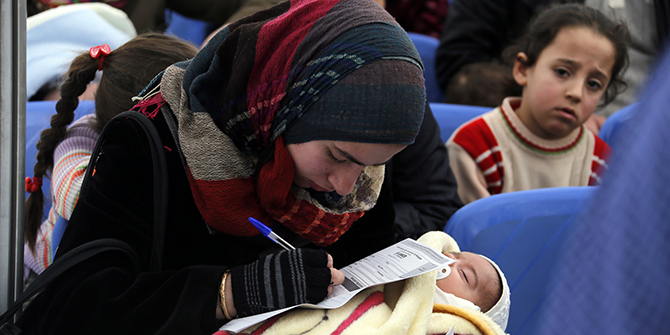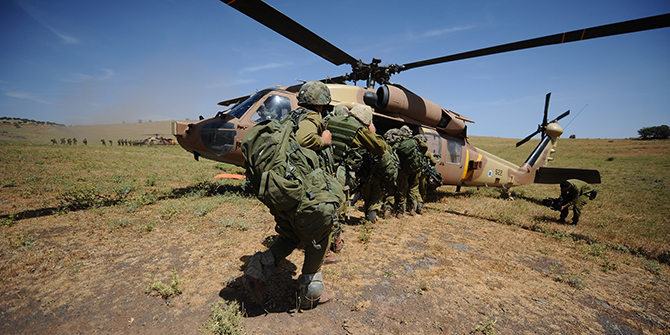by Filippo Dionigi

Among the effects of the Syrian civil war is the massive exodus of refugees flowing into neighbouring countries. Relatively to its size, Lebanon is the most affected state. The number of Syrians registered with the UNHCR in Lebanon is nearly 1.2 million, a quarter of its autochthonous population, and this is only a partial figure.
Perhaps surprisingly, Lebanon has coped relatively successfully with the crisis. This is a unique phenomenon for a country that has a reputation of fragile state based on a dysfunctional political structure reflecting its complex confessional composition. Lebanon has demonstrated generosity and adaptability towards the Syrians flowing through its open borders, especially at the local level where municipalities have taken up an enormous burden and absorbed most of the impact of the crisis not without difficulties. The Lebanese government has collaborated with international organisations to establish a vast structure for reception and services provision for refugees, which has no precedents. This is a tough lesson for EU countries which, on the contrary, are engaged in a pathetic political argument concerning a minuscule migrant population compared to what Lebanon has been through thus far.
Of course, the Lebanese situation has also been far from ideal in many respects. For example the legal ambivalence of the status of refugees, their freedom of movement, and the fact that international funding is only partly sufficient to cover the economic burden of the crisis, have made Syrians in Lebanon a vulnerable group. Nonetheless, incidents have been relatively sporadic, if we take into account the magnitude of the crisis.
What is concerning, however, is that something in this process has stopped working, at least since mid-2014. The Lebanese government has begun voicing increasing frustration towards the presence of Syrian refugees in Lebanon. Measures have been taken to restrict the possibility for Syrians to enter Lebanon, some of them being suspected of not being ‘real’ refugees but rather free-rider economic migrants benefitting from the aid provided by international organisations while also maintaining a job.

In January 2015, a new border policy was implemented by the Lebanese government that almost totally bars Syrians from entering Lebanon on a merely humanitarian basis. Instead, Syrians at the borders are asked to justify their presence whether for work, trade, transit, or tourism among other options. Tying Syrian presence in Lebanon with working status has created uneasiness among refugees in Lebanon. In addition to this, the criteria to renew the status of UNHCR-registered refugees already present in Lebanon have become more demanding and very expensive. The UNHCR currently calculates that the new measures will cost to an average family of five about 1375 dollar for one year, and in addition to this, those registered with UNHCR, are demanded to sign a pledge not to work in Lebanon.
These measures have created an increasing sense of insecurity among the poorest Syrian refugees who fear of not being able to renew their registration or find it impossible to cover the costs of their basic needs. Many of them, if they fail to renew their documents, risk of falling into an even more uncertain legal status which will render them prone to further vulnerability. Such measures, therefore, may have the effect of increasing poverty among refugees which, in turn, will become a growing social cost for the Lebanese state and society.
Refugees will tend to resort to ‘negative coping strategies’, for example using children for alms collection or for work, or even resorting to women trafficking and other illegal activities to guarantee sufficient income. These are phenomena that, to an extent, are already taking place; but further insecurity and marginalisation will inevitably produce an increase. Furthermore the segregation of Syrians risks creating a more hostile population towards their host making their presence more challenging to administer.
In addition to the closure of borders to Syrians displaced on a humanitarian basis, the government has recently requested from the UNHCR to stop registering refugees. This measure could backfire on Lebanon’s interests. Although the UNHCR has a vast operational structure, there may still be (and there most likely are) thousands of Syrians in Lebanon, who could not register with UNHCR. Closing the registration process will render them ‘invisible’, highly vulnerable, and also less and less accountable to the Lebanese authorities, which can only benefit from clear and transparent records of Syrian presence in Lebanon.
The new measures were a sudden reversal of Lebanon’s policy, which signals understandable fatigue among the Lebanese in coping with the situation but which risk to have unwanted consequences against national interest.
A working humanitarian machinery has been a crucial asset for Lebanon to be able to deal with the Syrian situation. The more recent Lebanon Crisis Response Plan has the capacity to potentiate both the humanitarian and development impact of the government and the international agencies targeting both the refugee population and the host communities.
There is a sense that the relative success in coping with the crisis was disproving the common perception of Lebanon as a fragile state, instead indicating a society surprisingly resilient to an overwhelming regional situation. The hope is that the Lebanese government, the UN, and other international partners, can soon find again the cooperative equilibrium that has allowed them to act effectively until a few months ago.
It is primarily in the interest of the Lebanese and the Syrians, and may prove wrong again the idea of a country constantly on the brink.
 Dr Filippo Dionigi is Leverhulme Early Career Fellow, researching the impact of the Syrian refugee crisis on Arab statehood from a comparative perspective. He is currently in Lebanon for his fieldwork. He has completed his PhD in International Relations at LSE and his book, titled Hezbollah, Islamist Politics and International Society, was published by Palgrave Macmillan in December 2014. Filippo tweets at @filippodionigi.
Dr Filippo Dionigi is Leverhulme Early Career Fellow, researching the impact of the Syrian refugee crisis on Arab statehood from a comparative perspective. He is currently in Lebanon for his fieldwork. He has completed his PhD in International Relations at LSE and his book, titled Hezbollah, Islamist Politics and International Society, was published by Palgrave Macmillan in December 2014. Filippo tweets at @filippodionigi.







4 Comments